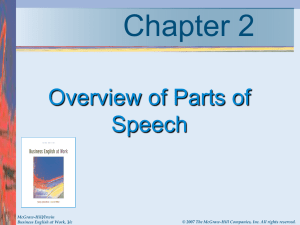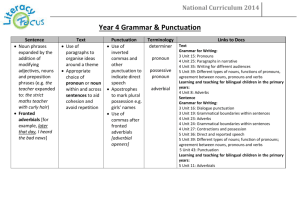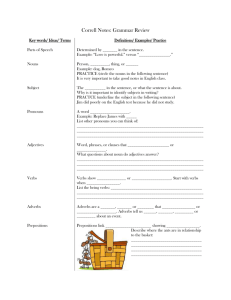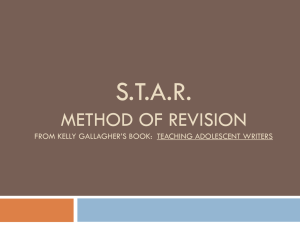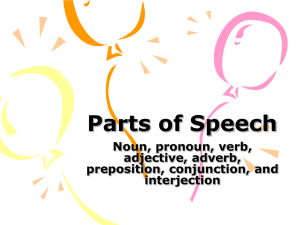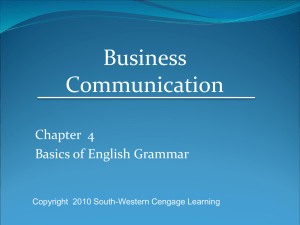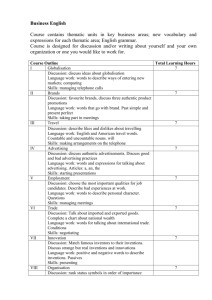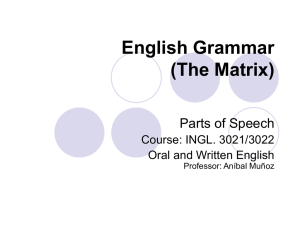LA 1-2 Curriculum Map
advertisement
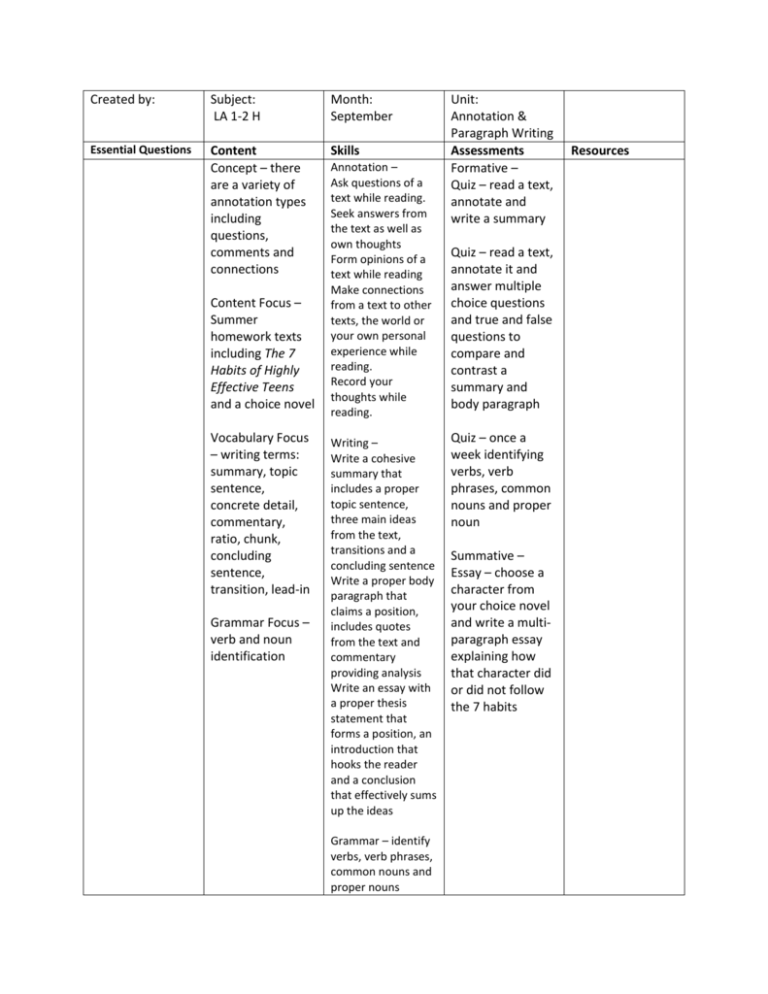
Created by: Subject: LA 1-2 H Month: September Essential Questions Content Concept – there are a variety of annotation types including questions, comments and connections Skills Content Focus – Summer homework texts including The 7 Habits of Highly Effective Teens and a choice novel Vocabulary Focus – writing terms: summary, topic sentence, concrete detail, commentary, ratio, chunk, concluding sentence, transition, lead-in Grammar Focus – verb and noun identification Annotation – Ask questions of a text while reading. Seek answers from the text as well as own thoughts Form opinions of a text while reading Make connections from a text to other texts, the world or your own personal experience while reading. Record your thoughts while reading. Writing – Write a cohesive summary that includes a proper topic sentence, three main ideas from the text, transitions and a concluding sentence Write a proper body paragraph that claims a position, includes quotes from the text and commentary providing analysis Write an essay with a proper thesis statement that forms a position, an introduction that hooks the reader and a conclusion that effectively sums up the ideas Grammar – identify verbs, verb phrases, common nouns and proper nouns Unit: Annotation & Paragraph Writing Assessments Formative – Quiz – read a text, annotate and write a summary Quiz – read a text, annotate it and answer multiple choice questions and true and false questions to compare and contrast a summary and body paragraph Quiz – once a week identifying verbs, verb phrases, common nouns and proper noun Summative – Essay – choose a character from your choice novel and write a multiparagraph essay explaining how that character did or did not follow the 7 habits Resources Created by: Essential Questions Subject: LA 1-2 H Content Concept – With every choice comes a consequence. What choices do the characters in a variety of literary texts make and how do they influence their destinies? Content Focus – Of Mice and Men and a choice independent reading novel Vocabulary Focus Continued – writing terms: summary, topic sentence, concrete detail, commentary, ratio, chunk, concluding sentence, transition, lead-in Vocabulary Focus New – foreshadowing, imagery, denotation, connotation Grammar Focus – pronoun and adjective identification Month: October Skills Annotation – Same as September Discussion – Have an academic discussion with your peers regarding denotation, connotation, foreshadowing and connections made to other texts, including 7 habits Be able to disagree with a peer and be able to support your arguments with evidence from a text and a tone of respect and understanding Writing –Write reflective paragraphs exploring the imagery, foreshadowing and connotation in OF Mice and Men Timed write -- Write an essay with a proper thesis statement that forms a position, an introduction that hooks the reader and a conclusion that effectively sums up the ideas Grammar – identify pronouns and adjectives Unit: Of Mice and Men Assessments Formative – Quiz – reading comprehension. 5 multiple choice questions on the novel (inferences and predictions, cause and effect, compare and contrast, and summarize) and a short answer (evaluate) on the novel Of Mice and Men Quiz – once a week identifying pronouns and adjectives Summative – Timed Write – decide who is ultimately responsible for Lennie’s death and write a multiparagraph essay explaining why Reflective Essay— Reading reflection on choice novel focusing on annotations – What questions, comments and connections did you have while reading? 750 words Resources Novel – Of Mice and Men Choice Novel – 1984 The Chosen Night Picture Bride Lord of the Flies Romeo and Juliet Created by: Essential Questions Subject: LA 1-2 H Content Concept – Greek mythology includes a variety of gods and goddesses that influence their world view and a variety of literature Content Focus – Variety of informational texts, including encyclopedias, nonfiction/reference books and websites The Odyssey excerpts Month: November Skills Research – Note cards Paraphrasing MLA citation Presentation – Teach the class about a god or goddess from Greek mythology Reading – Using context clues, visualization and text features to better understand a fiction or nonfiction text Vocabulary Focus New – works cited, annotated bibliography Writing – Write an annotated bibliography about a god or goddess from Greek mythology Write a business letter with a proper thesis statement that forms a position, an introduction that hooks the reader and a conclusion that effectively sums up the ideas Grammar Focus – adverbs and verb/noun/pronoun/ adjective review Grammar – identify verbs, nouns, pronouns, adjectives and adverbs Vocabulary Focus Continued – writing terms: summary, topic sentence, concrete detail, commentary, ratio, chunk, concluding sentence, transition, lead-in Unit: Greek Mythology Assessments Formative – Quiz – True or False quiz regarding appropriate citations Quiz – Reading comprehension of The Odyssey, fill in the blank Quiz – once a week identifying verbs, nouns, pronouns and adjectives Summative – Annotated Bibliography – write an annotated bibliography on 5 research sources for you assigned god/goddess Business letter – Write a letter to Zeus arguing that Odysseus should or should not be held accountable for the death of his men and the suitors Resources Textbook – The Language of Literature McDougal Littel Variety of research texts Created by: Essential Questions Subject: LA 1-2 H Content Concept – Similar characters and plots can exist in different narrative modes Content Focus – film O Brother, Where Art Thou? Independent reading choice novel Vocabulary Focus Continued – writing terms: summary, topic sentence, concrete detail, commentary, ratio, chunk, concluding sentence, transition, lead-in Vocabulary Focus New – narrative mode, protagonist, antagonist, plot structure Grammar Focus – Review: verbs, nouns, pronouns, adjectives, adverbs Month: December Skills Compare/Contrast – Identify similarities and differences between a variety of narrative modes Writing – Write a summary of the film Write a film review that includes a thesis statement and compares and contrasts a film and a written text Grammar – identify verbs, nouns, pronouns, adjectives and adverbs Unit: Greek Mythology Assessments Formative – Quiz – Write a summary of the film Quiz – once a week identifying verbs, nouns, pronouns, adjectives and adverbs Summative – Film Review – write a film review comparing and contrasting the film O Brother, Where Art Thou and The Odyssey Resources Textbook – The Language of Literature McDougal Littel Film – O Brother, Where Art Thou? Created by: Subject: LA 1-2 H Month: January Essential Questions Content Concept – Common themes exist among a variety of texts. Destiny can be influenced by outside sources but our choices are still most important Skills Content Focus – Play A Midsummer Night’s Dream Vocabulary Focus Continued – writing terms: summary, topic sentence, concrete detail, commentary, ratio, chunk, concluding sentence, transition, lead-in Vocabulary Focus New – theme, Shakespeare’s language Grammar Focus – Prepositions and review of verbs, nouns, pronouns, adjectives and adverbs Reading – Be able to use a variety of reading strategies, including context clues, text features and read alouds to better understand Shakespeare Writing – Write a summary of the play Grammar – identify verbs, nouns, pronouns, adjectives, adverbs, and prepositions Unit: A Midsummer Night’s Dream Assessments Formative – Quiz – Reading comprehension for each act – multiple choice and quote identification Quiz – once a week identifying verbs, nouns, pronouns, adjectives, adverbs, and prepositions Resources A Midsummer Night’s Dream Created by: Subject: LA 1-2 H Month: February Essential Questions Content Concept – Common themes exist among a variety of texts. Destiny can be influenced by outside sources but our choices are still most important Skills Content Focus – Play A Midsummer Night’s Dream Vocabulary Focus Continued – writing terms: summary, topic sentence, concrete detail, commentary, ratio, chunk, concluding sentence, transition, lead-in Vocabulary Focus New – theme, Shakespeare’s language Grammar Focus – conjunctions and review of verbs, nouns, pronouns, adjectives, adverbs and prepositions Reading – Be able to use a variety of reading strategies, including context clues, text features and read alouds to better understand Shakespeare Unit: A Midsummer Night’s Dream con’t Assessments Formative – Quiz – Reading comprehension for each act – multiple choice and quote identification Quiz – once a week identifying Writing – Write a summary of verbs, nouns, the play pronouns, adjectives, Presentation – adverbs, Individually or with a prepositions and group memorize a conjunctions portion of the play and recite to the class showing clear understanding of Shakespeare’s language Grammar – identify verbs, nouns, pronouns, adjectives, adverbs, prepositions and conjunctions Summative – Presentation of a scene of the play to the class, including puppets, costumes and/or props as deemed necessary and showing a clear understanding of the text Resources A Midsummer Night’s Dream Created by: Essential Questions Subject: LA 1-2 H Content Concept – Common literary elements exist in a variety of fiction Content Focus – Short Stories: “The Necklace” “The Princess and the Tin Box” “Where Have You Gone, Charming Billy?” “The Sniper” “The Most Dangerous Game” “The Scarlet Ibis” Vocabulary Focus: plot, exposition, rising action, climax, falling action, protagonist, antagonist, dynamic character, static character, conflict, theme, irony, symbolism Grammar Focus – Interjections and review of verbs, nouns, pronouns, adjectives, adverbs, prepositions and conjunctions Month: March Skills Reading – Be able to use a variety of reading strategies, including context clues, text features, read alouds identification of literary elements to better understand a text Writing – Write a summary of each story Write a paragraph for each story telling how a character was able to create his/her own destiny Analysis – Identification of literary elements and devices and being able to explain why they are important Grammar – identify verbs, nouns, pronouns, adjectives, adverbs, prepositions, conjunctions and interjections Unit: Short Stories Assessments Formative – Quiz – Reading comprehension for each story – multiple choice and short answer Quiz – once a week identifying verbs, nouns, pronouns, adjectives, adverbs, prepositions, conjunctions and interjections Resources Textbook – The Language of Literature McDougal Littel Created by: Essential Questions Subject: LA 1-2 H Content Concept – Common literary elements exist in a variety of fiction Content Focus – Short Stories: “The Necklace” “The Princess and the Tin Box” “Where Have You Gone, Charming Billy?” “The Sniper” “The Most Dangerous Game” “The Scarlet Ibis” Vocabulary Focus: plot, exposition, rising action, climax, falling action, protagonist, antagonist, dynamic character, static character, conflict, theme, irony, symbolism Grammar Focus – Mechanics: commas Month: April Skills Reading – Be able to use a variety of reading strategies, including context clues, text features, read alouds identification of literary elements to better understand a text Writing – Write a summary of each story Write a paragraph for each story telling how a character was able to create his/her own destiny Analysis – Identification of literary elements and devices and being able to explain why they are important Grammar – fix common comma errors and identify verbs, nouns, pronouns, adjectives, adverbs, prepositions, conjunctions and interjections Unit: Short Stories con’t Assessments Formative – Quiz – Reading comprehension for each story – multiple choice and short answer Quiz – once a week identifying comma errors, verbs, nouns, pronouns, adjectives, adverbs, prepositions, conjunctions and interjections Summative – Short story – write a short story that follows the proper plot structure and includes the literary elements of: protagonist, antagonist, conflict, theme and symbolism and/or irony Resources Textbook – The Language of Literature McDougal Littel Created by: Subject: LA 1-2 H Month: May Essential Questions Content Concept – Skills Content Focus – novel To Kill A Mockingbird Vocabulary Focus colloquial language Grammar Focus – Commas Reading – be able to use a variety of reading strategies to better understand colloquial language Writing – Analysis – Grammar – identify common comma errors and identify verbs, nouns, pronouns, adjectives, adverbs, prepositions, conjunctions and interjections Unit: To Kill A Mockingbird Assessments Formative – Quiz – Reading comprehension for each chapter – multiple choice and short answer Quiz – once a week identifying common comma errors, verbs, nouns, pronouns, adjectives, adverbs, prepositions, conjunctions and interjections Summative – Resources To Kill a Mockingbird Created by: Essential Questions Subject: LA 1-2 H Content Concept – Common themes and situations have permeated all that we have done this year Month: June Skills Content Focus – Review of content Analysis – Vocabulary Focus – Review of vocab Grammar – identify common comma errors and identify verbs, nouns, pronouns, adjectives, adverbs, prepositions, conjunctions and interjections Grammar Focus – Review of grammar Reading – be able to use a variety of reading strategies to better understand colloquial language Writing – Unit: Final Review Assessments Formative – Quiz – once a week identifying common comma errors, verbs, nouns, pronouns, adjectives, adverbs, prepositions, conjunctions and interjections Summative – Final exam timed write: what have you learned this year and how will you use it to create your own destiny? Resources

